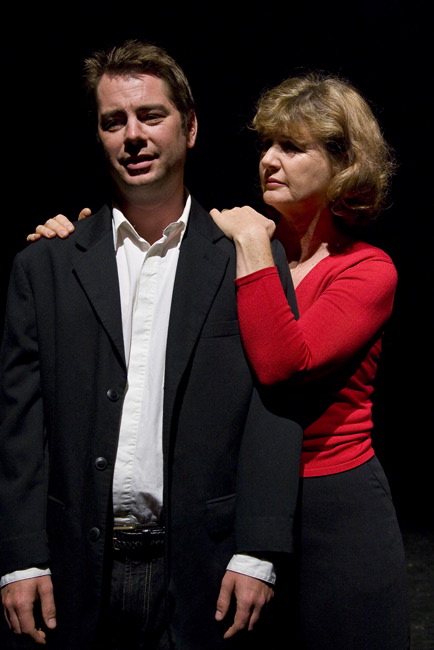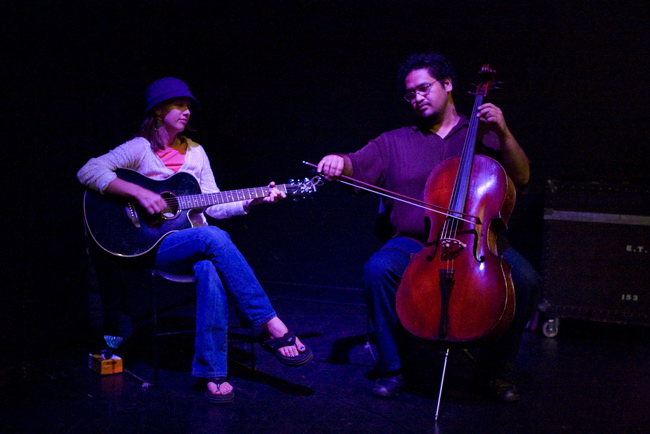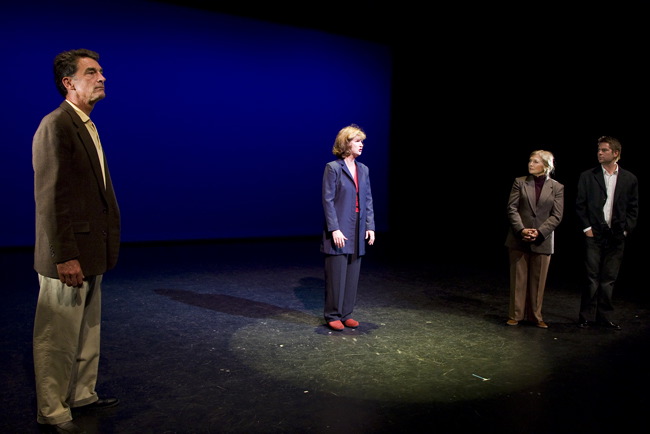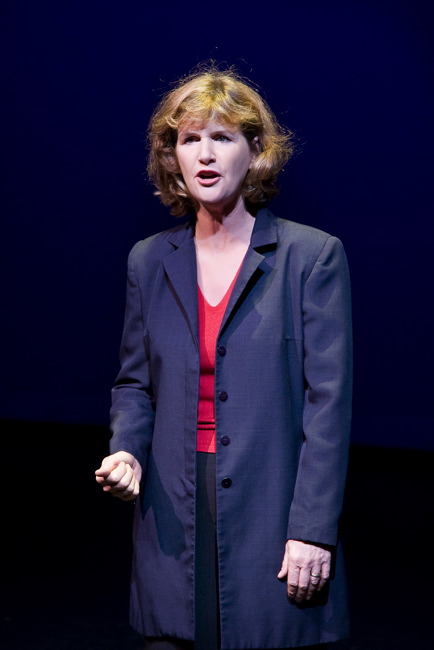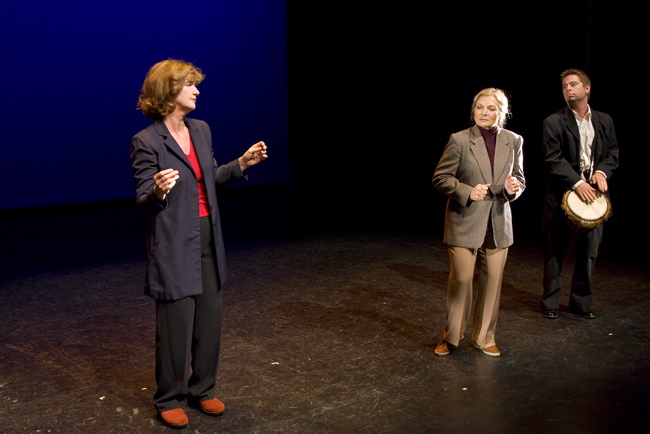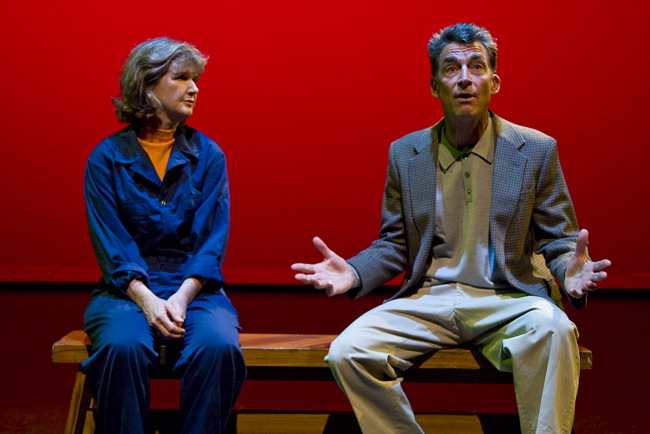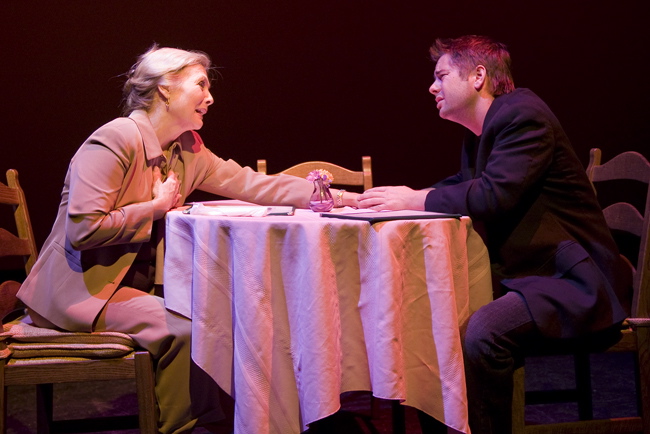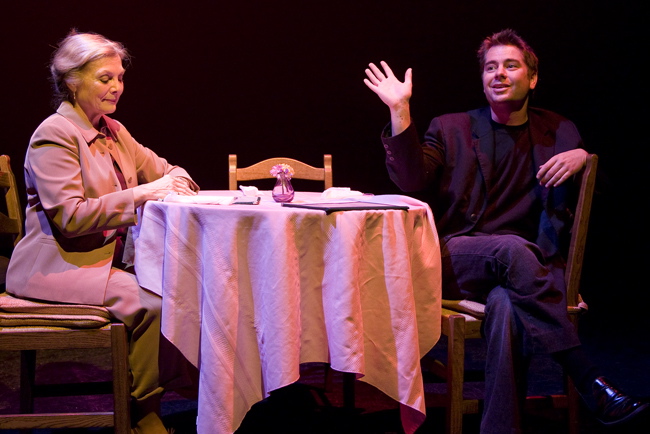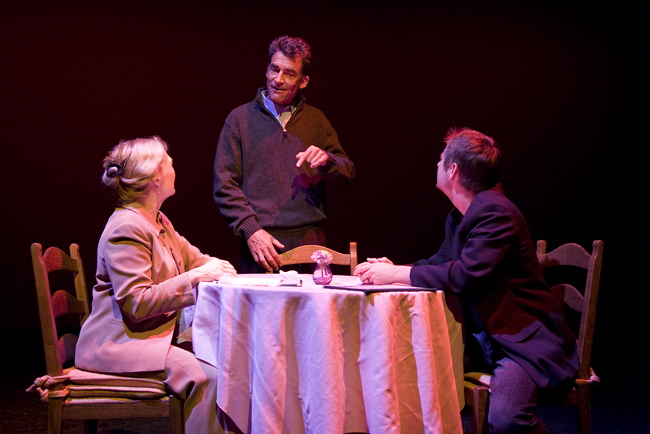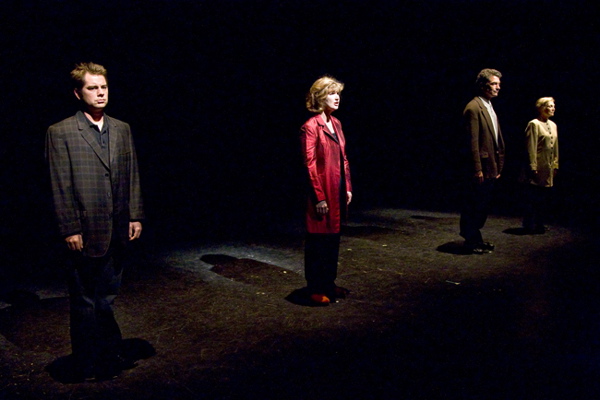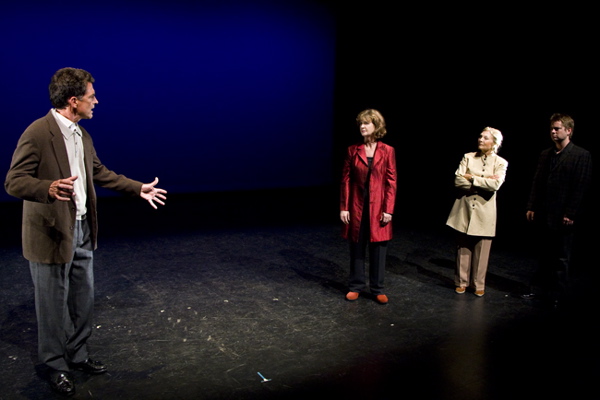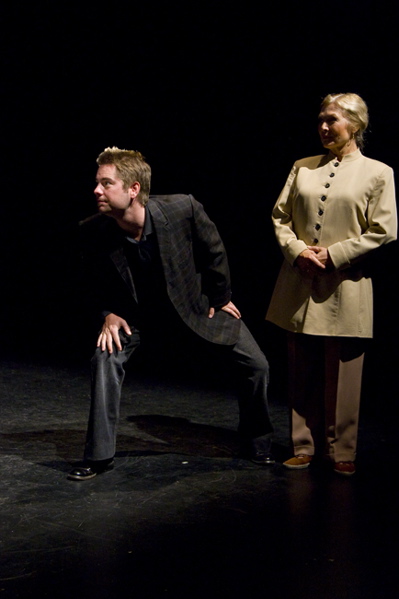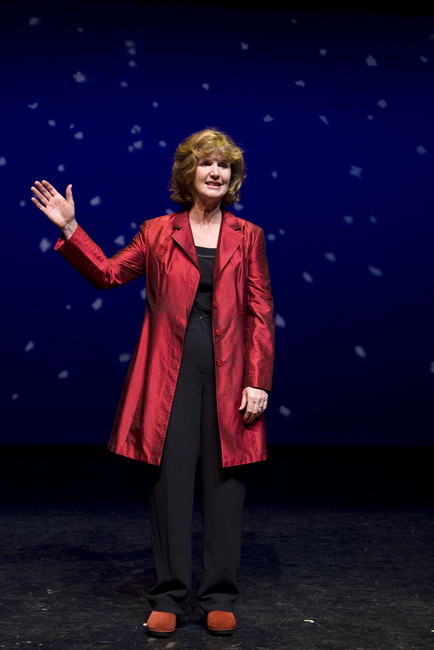“Bad Dog”
My son Alfred had a window in fall 2007 to do another play with me, and I put together an evening of theatre called “Bad Dog and Other Plays.” The title is not quite arbitrary: “Bad Dog” is a sequel to my 2000 play “Dogs Bark All Night”, which played at Center Stage Theater in Santa Barbara during the standoff between Bush and Gore, that strange interlude before the Supreme Court gave us Bush. It was still possible to be hopeful, and I had Janice “beat the rap” for the rash radical choices of her former life, ending the play on a tableau of Janice running for president, waving and smiling with her little family unit, backed by an American flag billowing in a sunny breeze. This was openly wishful thinking; subsequent events made it embarrassingly naïve. “Dogs Bark All Night” needed a “second act.” Alfred was living in Santa Barbara so it made sense to do it there. (We had done plays in Silverton and New York; this was the logical next stop.) With luck, I could get Laurel Lyle and David Brainard to play Janice and Bill, and Alfred was just the right age to play Tommy. (ClaireMarie Mallory had moved out of town so I would have to find a new Vera.)
I wrote “Bad Dog” in Silverton and Diamond, Oregon, in spring 2007. I wanted to be real, if not necessarily realistic, but in the depths of the Bush II reign, realism could only be bad news. I was aware that protecting my characters from harm or ill nature was limiting my seriousness and tried not to be sentimental. I worked out what would “really” be happening to them seven years after we last saw them: Janice has spent the time in prison; Tommy moved to New York to dance, but injury ended his dancing, and he has broken up with his great love and is miserable; Vera’s partner has been deported to Guatemala. Politics are a disaster. How could I inflict such a downer on the audience or actors or myself? Life is downhill but theatre is for pleasure and uplift. To hell with the tyranny of the real. What if Janice actually was president? What would I do if I were president? I imagined a kind of abstract theatre of voices that could slide from one reality into another. I realized I couldn’t solve the problems of the world, but I could write a play. I had four characters, after all, who were quite alive and spoke right up. With more than one reality in play, I could use the realistic scenes too!
The form of “Bad Dog” is more than a little like “Trouble”, with four discontinuous scenes that require the audience to assemble the story from fragments. Here I go further. Time goes in both directions at varying speeds. It is too short to stand alone, and to make it work as a production, I had the odd idea of putting three other plays of mine in between the scenes. This was a purely intuitive move, with no logical or traditional underpinnings. I and others worried that it would be confusing, but it wasn’t; the audience was perfectly comfortable with it, or else slunk away without a word. The normal thing would have been to do the three one-acts first and then “Bad Dog.” I tried, in rehearsal, running “Bad Dog” straight through, but it didn’t really work. It made “Bad Dog” stronger to break it up.
On the way to a final performance script I tried various sequences and combinations and ended up with the following:
Bad Dog I
More. More. I Want More! (see Short Plays)
Bad Dog II
Point Blank (see Short Plays)
Bad Dog III
Fast Forward (see Short Plays)
Bad Dog IV
I am perversely fond of “More More,” which I knew would be a good role for whoever played Vera. I originally had “Oliver & Lucifer” (see Short Plays) in the next to last slot. Alfred could play either of the parts, possibly with David, and I would have liked to see if I could make it work. It is heartfelt, and could be seen as a version of Tommy’s breakup (as “More More” could be a double portrait of Vera). I thought of doing it as a dance. But it is such a sad play, so full of the pain of breaking up, that I decided not to put us all through it but instead to do “Fast Forward,” which is approachable and likable and doable, with Alfred as Tim (me) and Laurel and David as Stu (Dad) and Foo (Mother). “Point Blank” is a piece of utter fluff, a perfectly frivolous experiment in loop form; we tried various approaches and wound up starting in the “middle” (with Grannie’s line “We’ll cross that bridge when the cards are on the table”) and doing it three and a half times, changing tempo and style at unpredictable moments: first “normal,” then fast, then normal again, then slow, with Southern accents, then with exaggerated affect. It worked fine: it took the audience to the very brink of feeling trapped in a nightmare and then became ridiculous in the best sense.
I went down in July to cast Vera and the four additional actors I needed for “Point Blank” and was very fortunate in the people I found: Susan Keller made Vera her own and did “More More” delightfully; Suzi Bodine, Melissa Paper, Tom Petra, and Melissa Ziemer completed the wacky extended family.
I decided up front to do the production on a bare stage, like a dance concert, in front of a cyc, with the most minimal of set changes: a bench, a table and chairs. It was a challenge to differentiate the various plays for the audience, which required staging and acting them in distinctly different styles, using the space differently, lighting them differently, costuming them differently. It was a treat to see the actors project entirely different personalities in the various plays. I was blessed to have the great Mary Gibson as costume designer: her costumes became the choices of the characters and in “Point Blank” were a great part of the fun. Alfred introduced me to Jeannot Maha’a, a fine cellist, who composed and played an artful musical score, at times joined by Melissa Ziemer. I had a wonderful time lighting the production, abetted by Brad Spaulding, the theatre’s first-rate technical director, and my excellent stage manager, Anglica Diaz.
Production Credits
“Bad Dog” was presented, as part of “Bad Dog and Other Plays,” by Re-Genesis (in association with Genesis West) at Center Stage Theater, Santa Barbara, September 14-22, 2007. It was directed by Michael Smith with the following cast and crew:
| JANICE | Laurel Lyle | ||
| BILL | David M. Brainard | ||
| VERA | Susan Keller | ||
| TOMMY | Alfred St. John Smith |
| Costume Design | Mary Gibson | |
| Lighting Design | Michael Smith | |
| Stage Manager | Angelica Diaz | |
| Asst Stage Manager | Diane Arnold | |
| Wardrobe | Gwynneth Alldiss | |
| Musical Director | Jeannot Maha’a | |
| Tech Director | Brad Spaulding |
“Bad Dog”
Janice, Tommy, Vera, Bill.
Scene 1
(Separate spots on each actor, in a row, come up as they appear.)
JANICE: This war is so much worse than the first one, which was so bad I had to speak out. The burning oil wells looked like the apocalypse turned upside down, with evil winning. At least it was short. Now it goes on and on. Seven years of Bush and everything has gone wrong. You remember my story, I hope, blood in the files, friends making bombs, underground for fifteen years, married a sweet guy, kept him in the dark. Had a kid. (TOMMY appears.) Gulf I was too much for me, I raised my head, and I was busted. I beat the conspiracy rap at first, told it like it is, ran for President before they locked me up. But my personal problems are trivial. My house is still standing. Nobody has killed my family. Prison was almost civilized, in its disgusting way. I am lucky to be white and not young. Seven years of good behavior. What else could I do?
TOMMY: Talk to me.
JANICE: What about?
TOMMY: Tell me what you know.
JANICE: Nothing is clear.
TOMMY: What is the lesson?
JANICE: We were wrong.
TOMMY: You don’t believe that.
JANICE: I mean before. Blowing things up never helps.
TOMMY: What should I do?
JANICE: Right opinions should prevail, but knowing everything only increases our dismay as the predictable disasters unscroll, and worse. I was wrong to think I could change anything.
TOMMY: That is not what I need you to say.
JANICE: I am really glad you have come home. I was worried about you.
TOMMY: I am worried about the world.
JANICE: The world is so beautiful, how can it be so screwed up? Stay. Stay close.
TOMMY: I don’t want to think about it.
JANICE: Bad dog.
TOMMY: Bad news.
JANICE: What should I do?
BILL: Honey?
JANICE: We’re in here.
TOMMY: Hi, Dad.
BILL: You made it. Great!
TOMMY: I do my best.
JANICE: We all do.
TOMMY: I wish you had won.
JANICE: Would you like to be living in the White House?
TOMMY: Yes, can we?
JANICE: I would be a good President.
TOMMY: I believe it.
BILL: So do I.
JANICE: O.K. then. Let’s do it.
(Lights change.)
BILL: Fifteen seconds.
VERA: I’m here too.
TOMMY: Where are we now?
BILL: Hi, Sis.
VERA (To TOMMY): Have you come back? I am so glad!
BILL: So am I. We need you.
JANICE: To hell with the tyranny of the real.
BILL: Ten.
TOMMY: What are you going to say?
VERA: You decide.
TOMMY: Mommy knows best.
VERA (To BILL): Remember when we were young?
BILL: Who could forget?
JANICE: Quiet please.
(4 seconds silence)
BILL: O.K., you’re on.
JANICE: My fellow Americans.
(Blackout)
(Light up softly on TOMMY, then VERA, then BILL)
TOMMY: I loved living in New York. Nobody knew anything about me. I could be anyone.
VERA: Who were you?
TOMMY: I could drink and get high and stay up all night talking with my brilliant friends. What ever happened to hanging out? I could sleep with anyone I liked. Nobody ever told me what to do.
BILL: We missed you.
(Lights change: brighter on Janice, speaking to the nation.)
JANICE: We have to be realistic. It will be heavy lifting to turn things around. Everything is complicated and interlinked. One bunch are making unimaginable amounts of money from the present arrangement, while millions more are going under, or gone. There is a connection. Our disillusioned allies adapted to the previous administration’s shameful distortions, they had no other choice, which strengthened those who cry revenge for the ruin of their cultures and lives. Nonetheless, with the consent of the Congress, the blessings of a bare majority of the Court, and the mandate of the good-hearted multitude of the American people, I mean to lead our nation forward into a generous spring of beauty and harmony and friendship for all people, all religions, all species. Many will doubt that the United States can recover its lost luster as a beacon of liberty and opportunity. We will survive our doubt. The human project is deeply dubious; but we are human and have to make the best of it. Naturally we are self-interested but we long for a better world and I believe it is possible. America’s wealth and strength enable and oblige us to help those in need of help on a whole different scale. Certain elements will remain hostile, like certain spiders, poisons, viruses, cancers, indeed our own mortality, and will never be eliminated. We must live with them and limit their damage. Our justified fears don’t have to rule our lives. We can be good.
BILL: Say I love you.
JANICE: That was my husband, Bill.
BILL: Say it.
JANICE: No, not that Bill. I am not Hillary. Don’t even think it. I am Dennis Kucinich. I am Medea Benjamin. I am Michelle Bachelet.
TOMMY: Who?
JANICE: The President of Chile.
BILL: Go on, say it.
JANICE: I love you, Bill. I love you, Tommy. I love you, Vera. Love is better than hate, or tolerance, or use. Love is a gift, a comfort, strength and consolation. I love you. Now get to work.
BILL: Thank you.
JANICE: It’s true.
(Lights change.)
VERA (To TOMMY): So what happened?
TOMMY: I don’t want to talk about it.
VERA: You can tell me.
TOMMY: Not now.
VERA: What are you going to do?
TOMMY: Be part of the family again. Mom, you were great. This is beyond cool.
JANICE: Do you like your room?
TOMMY: Are you kidding? I don’t know about the food, though. And I don’t like being watched all the time.
JANICE: I am going to change all that.
TOMMY: Can we have sushi?
JANICE: I don’t see why not.
TOMMY: What are you going to do, Aunt Vera?
JANICE: Vera is taking over the national parks. Parks are one of the most valuable things the government can provide for people. Once we bring the troops home and close the foreign bases and shut down the weapons programs, we will have money for parks and housing and health care and Amtrak and all the rest of it. This can be the greatest country in the world.
TOMMY: Mom, please.
JANICE: It’s true. I am really looking forward to it. Carmela is taking over immigration.
TOMMY: I thought she was deported.
JANICE: A lot of people were deported. What a mess! She has some good ideas, though. She is coming back, and then we’ll see what we can do. I have high hopes.
VERA: Thank you, hon.
JANICE: Thank you. The lesbian vote was critical, you know that. (To TOMMY) And your gay vote, that was terrific.
TOMMY: I’m not gay, actually.
JANICE: I know, but you were when it counted.
TOMMY: My former friends think I was faking. But I wouldn’t do that. I was in love.
JANICE: I know, honey.
TOMMY: I just don’t want to start over with another guy.
JANICE: You will figure it out.
BILL: What did you say? You’re not gay?
TOMMY: Do we have to talk about this?
BILL: Well that’s wonderful. Why didn’t somebody tell me?
JANICE: Bill, for heaven’s sake.
BILL: You know what I mean. Nobody can hear us.
TOMMY: I am not sure that is true.
VERA: I am looking into it.
JANICE: My assumption is that everything is known to everyone. The phones are tapped, the White House is bugged, e-mails are public domain, the press is out of control, as it should be, the rich people are stealing us blind, privacy is a lost art, and I don’t care. Say anything. Just don’t be a jerk.
BILL: You know what I mean.
JANICE: Oh Bill. Was he always like this?
VERA: Always.
BILL: Will you just stop it!
JANICE: We’re kidding. Lighten up. Give us a rhythm, Tommy. (TOMMY picks up a drum and sets a beat. The others move to it.) There, that’s more like it. That’s the kind of government I want this to be, with a beat people can relate to, not men in suits pretending to be rational.
BILL: What am I going to do?
JANICE: Cook. Clean. Smile. Keep me happy.
BILL: Be serious.
JANICE: Quiet please.
(4 seconds silence)
VERA: O.K., you’re on.
JANICE: Hey, everybody.
(Blackout. Drumming continues.)
Scene 2
(Some time earlier. Barred light up on JANICE, in prison garb, sitting on a bench, center. BILL comes in, sits beside her. They do not touch.)
BILL: Tomorrow morning, they say, they are going to put you out at six a.m.
JANICE: Thank god I have you, Bill. What would I do without you? Hitchhike?
BILL: They think we won’t be able to get any press out at that hour.
JANICE: I don’t want any press.
BILL: The story dies without the door opening in the prison wall and you coming out, smiling into the sunrise as you realize that you are free, still beautiful after everything they did to you.
JANICE: They didn’t do anything to me. And I am not free. And I am not smiling. No press. I mean it.
BILL: I thought…
JANICE: I don’t want to play their game. I won’t be an item in the news. I won’t be talked about and analyzed and then put away in a box on a shelf. What ever happened to Sharon Murphy? I have been on a shelf for seven years. Back off, Bill.
BILL: I didn’t…
JANICE: Seriously, I do not want media attention right now. Let me slip back into our little life without being noticed, will you? I’m sorry, I didn’t mean to be sharp. Thank you, Bill, I mean it, for everything, for standing by me, for loving Tommy, for being here now and for picking me up at six a.m. tomorrow at the prison gate. I love you for it, and I love you for yourself. Yourself, Bill! Think of that. Who are you, Bill? Ask yourself. What are you accepting without thinking about it? What should we be doing with our lives?
BILL: I just want you back.
JANICE: That is so sweet.
BILL: I want to be sweet. I know it sounds sappy but I don’t care.
JANICE: I don’t know if I can do this.
BILL: I wish I could kiss you. What?
JANICE: Come back. Be your Janice. Go on with the farce, which is not necessary anymore, which nobody believes. I will try, I will, I don’t know what else to do, but my thoughts are…undead…not comic… I am possessed by this crisis we are digging ourselves into, deeper and deeper. We all are. Not just us, America is not the worst. No, you’re right, we have to live. Did you get in touch with Tommy?
BILL: Yes, we are going on Tuesday. Everything is arranged.
JANICE: I can’t go.
BILL: Why not? It is all planned. I bought our tickets. We talked about it.
JANICE: I’m going to have a thing on my ankle. I can’t go anywhere.
BILL: I’m not going by myself.
JANICE: How does he sound?
BILL: I didn’t talk to him. I never talk to him, but then when I do, it’s like he was there all the time.
JANICE: Please go. Take Vera. You can explain. I don’t want him to worry about me. I don’t know if he does or not. Think about it. Where were you when you were twenty-nine?
BILL: Right here. I mean, not far from here, actually. I had a room out on Skyline with some guys from work. It was a good situation. Well, not really.
JANICE: What was your mother doing?
BILL: How should I know? The usual, I suppose.
JANICE: And what was that?
BILL: She was not in prison. She was not a radical.
JANICE: You don’t know what she was thinking. What did she dream about? What was going on between them in the dark? Who was she really? You were gone.
BILL: I’ve been so lonely. I needed human contact. I caught myself grabbing guys at work, you know, by the arm, a quick squeeze of the shoulder, a pat on the back. I wanted them to touch me. It felt good, you know, just the contact.
JANICE: I hear you. Me too.
BILL: I can’t touch women, although I’d like to.
JANICE: It won’t be long now.
BILL: I love you, Janice.
JANICE: You know what is happening, don’t you?
BILL: What do you mean?
JANICE: We will talk later. I will totally level with you this time, I promise. No more secrets. Deal?
BILL: I don’t have any secrets to trade.
JANICE: I bet you do. It doesn’t matter.
BILL: I don’t need to know everything.
JANICE: You do, you have to, I can’t hold back, I mean I won’t, this time, I’ll be damned if I will. If you can’t take it, tough.
BILL: Darling, lighten up.
JANICE (Stretching, breathing): You’re right. Oh! Please! (Big sigh) Our time is almost up. Is there anything else?
BILL: The house is clean. Everything is put away. I didn’t have anything else to do so I cleaned. I had a yard sale and threw a lot of stuff out, I hope you don’t mind.
JANICE: No, I don’t want stuff, I don’t miss stuff, I want space. I want a quiet clear space where I can think. I want a long view where I can see for miles.
(The lights fade out.)
Scene 3
(A week later. New York. TOMMY and VERA are studying menus at a small table in a crowded bistro.)
TOMMY: Are you still a vegetarian?
VERA: He wanted to get something for you, and I wanted a chance to talk to you first. How are you?
TOMMY: Why didn’t Mom come? She’s the one I wanted to see. I mean, I’m glad to see you, Aunt Vera. But…
VERA: She couldn’t. She’s home but she can’t leave the state. You could have gone there. She rather desperately wants to see you, it’s been so long.
TOMMY: I can’t. I feel terrible. I am busy. I am in the middle of a million things. I have a life.
VERA: We all do, honey. (Tearful.)
TOMMY: What’s the matter?
VERA: My sweetheart has been deported. I thought you knew. I feel completely lost without her. I can’t sleep. I can’t think. I barely notice other people. Chloe is freaked out, and Suzy feels so neglected she is missing baskets. Carmela is their other mom.
TOMMY: Nobody told me.
VERA: I called you repeatedly but you never called me back. You should call people back immediately.
TOMMY: There is no excuse. I am bad. I am a bad person.
VERA: You can do better than that.
TOMMY: No really. I thought I was the one having a hard time. I didn’t want to bring you down.
VERA: What are friends for? So, what, what is going on?
TOMMY: You could have left me a message.
VERA: Tell me.
TOMMY: Well I am paying a ridiculous rent for a dump in a slum and working for a madman who belittles and insults me and gets his sick kicks by treating his staff like shit. I have to work as many hours as he deigns to give me just to pay my rent. Then I go home and cry.
VERA: I thought you had somebody.
TOMMY: I had a relationship that I thought was… well it was… anyway it’s over, and my heart is broken, not for the first time, either, but this was by far the worst. I’m over it. No, I’m not over it. Talking about it just reminds me how miserable I am. What else do you want to know?
VERA: I love you, honey. I want to know what’s going on even if I can’t help you deal with it. Indulge me. What about your dancing? I know you were out for a while.
TOMMY: Dancing was my life, and that’s over too.
VERA: I thought you were all better.
TOMMY: I can walk, but I can’t dance.
VERA: I didn’t realize.
TOMMY: I should have told you, but I really didn’t want to talk about it. Bill wouldn’t understand, and Mom was, well, you know.
VERA: Oh honey.
TOMMY: That is exactly what I didn’t want to hear.
VERA: Why not? I love you. It won’t hurt you to let me sympathize. God knows I have needed sympathy a few times myself. Bill has been great. Did he tell you Chloë and I are living there? I guess not. Janice wants us to stay. I thought she might want to be alone. It was her idea for me to come to New York. I have been talking to a lot of people, and I’m going to see some more in Washington on the way back.
TOMMY: Are you getting anywhere?
VERA: Maybe. I have a message for you from your mom.
TOMMY: What is it?
VERA: Come home.
TOMMY: I am home. I live here now.
VERA: No, really. Think about it.
TOMMY: Mom was running for President, for God’s sake. Dad and I were like cardboard cutouts. Prop us up. Smile, wave. You know what it was like, you were there.
VERA: Did she ever have a chance?
TOMMY: She was right about everything, I was proud of her. Then she was arrested again. Dad couldn’t help. He had based his whole personality on Mom’s magical perfection, and she turned out to be someone else, and my real dad is a one-armed, one-eyed Trotskyite on the lam in deepest Mexico. Home?
VERA: You were right to leave, I didn’t mean that for a second. You had no choice. You had to save yourself. And it was time to grow up. Sometimes we all have to move on. But just because you left doesn’t mean you can’t come back. I have a vision. This could work for all of us. But we don’t have to talk about it now. Here’s Bill.
(BILL walks into the light.)
There you are! I was getting worried.
BILL: I was completely lost. I mean I knew where I was, and I knew where I was going, but the reality of actually being there and doing it escaped me for a minute.
VERA: Never mind, you made it.
BILL: It was so strange. I felt like a cipher. Like a robot. Like part of a machine. Like a stalled program. I felt like I never had been real. Then I started up again, and now it is really me, but in a different way.
TOMMY (Rising): Hi, Dad.
BILL: It is difficult to explain but I think something important happened. Watch. You’ll see. You bet. Tommy. Hello.
(After a moment of hesitation, they hug.)
TOMMY: Hey, Dad.
BILL: Wow. You feel strong. You’re bigger than I remember.
TOMMY: It has been a long time.
BILL: You could have come to see me.
TOMMY: You could have come to New York.
BILL: But your mom wasn’t there so I guess it didn’t make sense. I figured you didn’t want to see me. I was afraid of New York.
TOMMY: Hey, Dad! I’m glad to see you. Thanks for coming!
BILL: It isn’t so bad, actually. I like it. I could see living here.
TOMMY: I have been playing soccer in Central Park, believe it or not. I’m on a team. We are not very good but we have a good time. How about you?
BILL: I swim, three, four times a week. I’m up to a mile. Sixty-four laps.
TOMMY: How’s Mom?
BILL: She misses you. We would like you to come home for a while. She won’t be able to travel for a year at least and she needs you.
TOMMY: What is this, a plot?
VERA: I’m starving. Let’s order. Don’t they at least give us bread?
(Lights out.)
Scene 4
(A month later. JANICE, TOMMY, VERA, JANICE, BILL, in separate tight spots.)
BILL: They did a recount, not because it was close, it was practically unanimous. Everybody woke up. Some kind of comet dust. They are still not sure. It is worldwide. Power was a drug but it stopped working. There was huge resentment of the previous lot but they let it go. Janice was still willing. We all promised to help.
VERA: We have exhausted the possibilities. Carmela has been gone for three years. I went down there with Chloë and we loved it, such a warm culture compared to ours, but neither of us could speak the language and we did not feel safe. Her father was assassinated. The pool house was torched. Every night we heard shooting in the neighborhood.
TOMMY: Mom would have liked me to be attorney general. Unfortunately that is not where my interests lie.
JANICE: It’s all right, honey.
VERA: And Susan needs me here. She seems mature, she is seventeen, she is a champion point guard, but how long did it take you to grow up?
TOMMY: Nothing is real to me except music and movement and feelings, nuance, inner development, subtle hidden meanings. Nothing is as simple as it seems. Nothing is simple.
JANICE: Love is simple.
BILL: Where are we now?
VERA: Help me. I am desperate.
BILL: No you’re not, sweetie, you are doing your best, this too will pass. We are working it out.
TOMMY: There is nothing I can do.
BILL: How’s school going?
TOMMY: Good.
VERA: Janice? Are you with us?
JANICE: Speak a word and there it is, existing, it can’t be taken back, silence is violated and only slowly regenerates, the little waves go on bouncing around inside your ears. Later the best and worst can and will be brushed aside, replaced, lost in the clutter. I thought, we all thought, that if we spoke clearly, spoke the things we all agree upon, the busy blankness of the swarming screen would resolve, those moments of revelation at the end of the episode, the exquisite pleasure of the flow state, love, warm bodies, tiny epiphanies of closeness as the credits roll, eyes closed, heads touching, would be enough. It is enough. The general toxicity can be purged by denial and neglect and right living.
(Lights change)
TOMMY: I can’t stay. I have a date.
JANICE: Is it who I think it is?
TOMMY: I am not abandoning you. I will be back. But I can’t live your life. I have my own.
JANICE: I know you do, just live it close.
BILL: Honey?
JANICE: We’re in here, in the Oval Office.
TOMMY: Hi, Dad. I’m home.
BILL: I saw the funniest thing.
JANICE: Where were you?
BILL: Walking on the Mall. The cherry trees are lavishly blooming around the Lincoln Memorial. This is my favorite time of the year. People smile at me but leave me alone. The crazies know I can defend myself. One guy came at me with a knife but I flipped him into the pond. I’m glad you got rid of the guns.
JANICE: I had to.
TOMMY: What happened?
VERA: I have to go the airport. Carmela’s plane is coming in.
TOMMY: I’ll come with you.
BILL: Are you home to stay?
TOMMY: We all are.
VERA: The delegation from Venus wants to take you out to dinner.
JANICE: They know what I think.
BILL: Ten seconds.
JANICE: Thank you all for hanging in. I mean it. This wouldn’t be nearly as much fun if I didn’t have every one of you on my side.
VERA & TOMMY (Dramatically): You’re doing it for all of us!
BILL: Is something happening?
JANICE: Quiet please.
(4 seconds silence)
TOMMY (Quietly): O.K., you’re on.
JANICE (Opening her arms wide): Fellow Earthlings . . .
Reviews
from the Santa Barbara News-Press, September 19, 2007
‘Bad Dog’ deserves treats: Michael Smith’s plays center on family relationships
by Justine Sutton
“The world is so beautiful—how can it be so screwed up?”
So posits a son to his mother, who aspires to become president of the United States, in the first segment of Michael Smith’s “Bad Dog,” which opened at Center Stage Theater last weekend. The evening of short plays continues Thursday and runs through Saturday.
Appearing non-chronologically, the play’s four scenes represent the different points of view of four family members—the mother with high political ambitions, her supportive husband, their confused but loyal son, and the somewhat highly strung aunt.
And with this glimpse into their world, we see the beautiful and screwed up aspects of life. There are somber discussions between the family members of weighty social issues, and we come to understand the very personal ways in which they feel annoyance and affection for each other.
As Janice, the strong head of the family, Laurel Lyle was wonderful as a subtly shaded character with a huge capacity to protect and love her family, her nation, and her planet. David Brainard was sweet and unassuming as Bill, the man behind the great woman.
Playing the role of their son was Mr. Smith’s own son, Alfred St. John Smith. Overwhelmed by the attention his family receives and grappling with his own personal issues, Tommy remains proud of his mother’s accomplishments.
“Bad Dog” is a sequel to “Dogs Bark All Night,” written in 2000 and performed during the Bush-Gore election standoff. It re-examines the earlier play’s themes to the tune of the current political climate, and Ms. Lyle and Mr. Brainard return to the roles they originated.
These four scenes were interspersed with other short plays written by Mr. Smith and penned during the past 40 years.
“More. More. I Want More!” was the oldest and shortest piece, written in 1966 with John P. Dodd and Remy Charlip. Susan Keller performed both parts of the dialogue between two characters—one naive and the other sophisticated. Ms. Keller made a good attempt at material that seemed awkward and clunky. Mercifully, it only lasted a couple of minutes.
“Fast Forward” (presented in 2000 at Dramatic Women’s “Santa Barbara Confidential”) starred the younger Mr. Smith, who, as Tim, delivered his performance with a candid and disarming style. In this play, Tim’s forays into adulthood and details of his parents’ relationship were presented in a straightforward manner that conveyed a satisfying sense of emotion and place, but the piece lacked dramatic tension. At key moments, Mr. Brainard and Ms. Lyle, in the role of his parents, passed through silently, which was quite effective visually.
“Point Blank,” written in the early 1980s, was a looping piece, filled with non-sequiturs and witty word play. Here again, the theme was family politics, as a disparate clan attempted to go on a picnic.
Each cycle of the play took a different flavor, as the actors delivered the same lines, adding shadings of nuance and style. The surrealism was delightful, and it was possible to lose oneself in the flow. Particularly notable here for their comedic timing and delivery were Melissa Rose Ziemer, who sank her teeth masterfully into the small role of Marge, and Suzanne Bodine as Grannie, who carried one of he only developing threads through the piece.
Before the show’s start and between the acts, beautiful live music was provided by Jeannot Maha’a on cello and Ms. Ziemer on guitar and vocals.
All in all, it was refreshing and thought-provoking evening of theater, with some old dogs and a few new tricks.
from The Independent, September 20, 2007
Postmodern Prometheus
by Charles Donelan
Janice (Laurel Lyle), the protagonist of Michael Smith’s Bad Dog, is a mother, a presidential candidate, and a former terrorist. Like the ancient Greek Prometheus, Janice sins against the gods by bringing the gift of fire to the people. In her case, that gift takes the form of homemade bombs and the spirit of violent 1970s radicalism.
At the end of Dogs Bark All Night (2000), presented earlier the same evening, Janice turns herself in to the police after having lived for years under an assumed identity and starting a family with her sympathetic husband, Bill (David Brainard). Leaving Bill and her son, Tommy (Alfred St. John Smith) behind, Janice takes responsibility for crimes she committed years before—yet her final scene in the play is not the one in which she is locked away. Instead, it is a presidential candidate’s formal speech, one full of attacks on American militarism and candid and hopeful ideas about how to change America and make it right.
In the sequel, Bad Dog, Janice makes her dream campaign a reality—or at least as real as anything else in the play’s interiority-tinged, mostly prop-less light-scape. Released from prison after a stiff sentence of eight years, Janice picks up the pieces with her family, while her campaign becomes a serious run for the White House. By responding to Dogs Bark All Night with Bad Dog, Smith plays Percy Shelley to his own Aeschylus, answering the dilemma posed by “Janice Bound” in a glorious, positive, poetic, and philosophical “Janice Unbound.”
Of the three interstitial plays, Point Blank and Fast Forward stand out. The “loop play” Point Blank employs a cyclical structure in which an eight-person ensemble repeats a sequence of lines and actions beginning and ending anywhere, for as many times as they like. The threshold for entering this piece is steep, but once you’re in, the payoffs are worth it. Tom Petra, Melissa Rose Ziemer, Suzanne Bodine, Alfred St. John Smith, Susan Keller, and Melissa Paper all connected with the inner freedom of repetition as the second half of the piece enacted the eening’s theme of release through forgiveness. In Fast Forward, Alfred St. John Smith had a lot to memorize as he sprinted through the poignant story of several generations and lifetimes played out against a ruefully observed and historically accurate Santa Barbara backdrop. Michael Smith’s fathering of this thoroughly fascinating evening extended to the lighting design, which, given the minimal stage set and tight blocking, became almost like another member of the cast.
